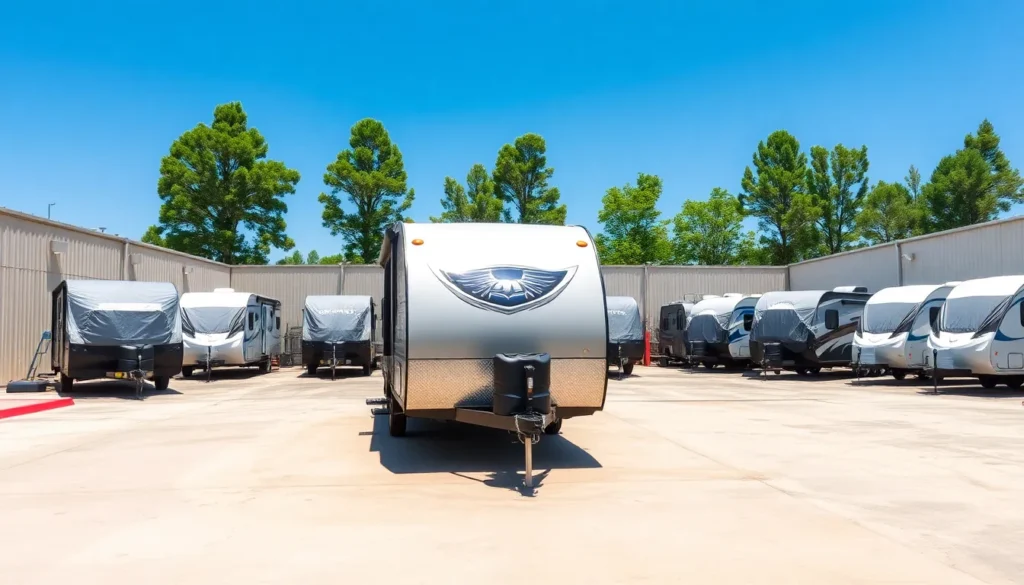Storing a travel trailer can feel like trying to fold a fitted sheet, confusing and unruly, yet somehow, everyone seems to do it. Whether you’re an avid camper or just dipping your toes into the RV lifestyle, understanding the ins and outs of travel trailer storage is essential. After all, a little planning goes a long way in keeping your investment safe and sound when it’s not hitting the open road. So grab that cup of coffee, and let’s explore a comprehensive guide to travel trailer storage that even your grandmother would approve of.
Table of Contents
ToggleUnderstanding Travel Trailer Storage Needs

When it comes to travel trailer storage, the specifics can get a bit convoluted. First off, the size of your trailer plays a pivotal role in determining storage needs. Smaller travel trailers, often dubbed ‘compact’, can usually fit in a tighter space, whereas larger models might require a bit more maneuvering.
Different climates can also dictate how a travel trailer should be stored. An area with harsh winters and heavy snow might necessitate more weatherproofing than a dry, temperate region. Understanding these needs ensures proper care during those long months of inactivity.
Types of Travel Trailer Storage Options
Navigating the world of travel trailer storage options can feel like wandering through a maze, without a map. But don’t fret. Here’s a breakdown of the most common storage types:
- Indoor Storage: This option keeps your travel trailer protected from the elements, pests, and UV rays. Conditions are controlled, ensuring optimal safety.
- Outdoor Storage: More affordable, outdoor storage means your trailer is exposed to the elements, which can lead to premature wear and tear. Tarps or covers are often recommended.
- Self-storage Units: Typically fenced and monitored, these units provide a secure option for your trailer. They vary in size, so be sure to choose one that fits comfortably.
- At-home Storage: If local regulations allow, keeping your trailer at home is convenient but requires proper maintenance practices to avoid driveway eyesores.
Preparing Your Travel Trailer for Storage
Now that the storage type is chosen, preparation comes next. Here’s what to do before waving goodbye to your travel trailer:
- Clean Thoroughly: Dirt and grime can turn into permanent stains or mildew. Clean both interior and exterior surfaces, paying special attention to the roof and undercarriage.
- Remove Perishables: Anything edible should be taken out to prevent unwanted guests (a.k.a. bugs and rodents).
- Check for Damage: Inspect for leaks or other damage to address any potential issues before storage.
- Drain Water Systems: This helps avoid problems with freezing and bursting pipes during colder months.
- Cover Up: Use a good quality cover designed for travel trailers to provide protection from UV rays and precipitation.
Best Practices for Travel Trailer Maintenance During Storage
Storage isn’t just about placing the trailer in a spot: it’s also about ensuring it’s in tip-top shape for future adventures. Here are some maintenance practices to consider during storage:
- Regular Checks: Periodically inspect the trailer for signs of wear, leaks, or pests. Early detection can save a lot of hassle later.
- Battery Maintenance: Disconnect the battery and check its charge. Consider using a trickle charger to keep it in good health.
- Tire Care: Maintain proper tire pressure and consider putting the trailer on jack stands to reduce tire flattening.
- Sealants and Lubrication: Check door and window seals for cracks. Lubricate locks and latches to prevent rust and sticking.
Choosing the Right Storage Location
Selecting the right storage location for a travel trailer is akin to picking the perfect vacation destination, attention to detail is key. Here are factors to consider:
- Proximity: The closer the storage is to home, the easier access will be for maintenance checks and quick trips.
- Security: Look for outdoor storage facilities that are secured and monitored. Cameras and fencing are signs of a good facility.
- Environment: Ensure the place doesn’t have potential hazards such as low hanging branches, flood-prone areas, or a high pest population.
Common Mistakes to Avoid When Storing a Travel Trailer
Even the experts make mistakes. Learning from them is the first step to ensuring success. Here are some common pitfalls:
- Neglecting Maintenance: Thinking that storage means no care is a huge mistake. Neglect can lead to significant issues down the line.
- Ignoring Local Regulations: Some areas have specific zoning laws around RV storage. Ignoring these can lead to fines or conflict with neighbors.
- Forgetting to Prepare for Weather: Failing to consider local weather conditions can result in damage. Always be proactive.





